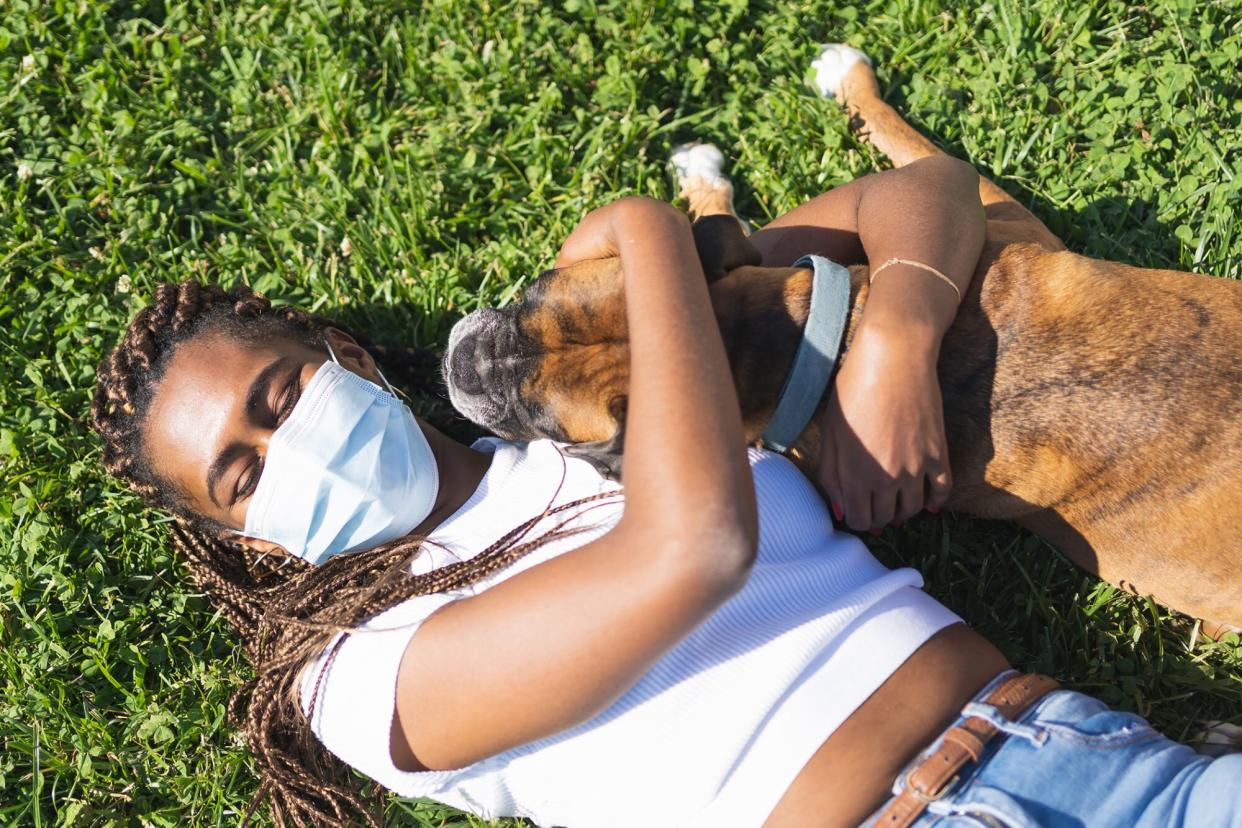Can Dogs Get COVID-19?

Marc / Adobe Stock
TABLE OF CONTENTS
On This Page
Can Dogs Get COVID-19?
COVID-19 vs. Canine Coronavirus
Can I Give My Dog COVID-19?
Symptoms
Treatment
Is There a Coronavirus Vaccine for Dogs?
The COVID-19 pandemic has filled all of us with more questions than answers. Fellow dog lovers, if you're anything like me, then you've wondered if and how the novel coronavirus can affect your trusted companions. Having more time at home has given us pet parents extra time with our loyal pups, but it's also making us contemplate what happens if our dogs get COVID-19.
Can Dogs Get COVID-19?
It's certainly possible for dogs and other domestic pets to contract COVID-19, the disease caused by the SARS-CoV-2 coronavirus. The Centers for Disease Control (CDC) says that most infections occur after pets have been in close contact with people infected with the virus that causes COVID-19.
What Is the Difference Between COVID-19 and Canine Coronavirus?
Coronaviruses are a large family of viruses that can cause illness in animals, including humans. Many types of coronavirus cause mild upper-respiratory tract illnesses like the common cold. There are two primary forms of canine coronavirus. Respiratory Canine Coronavirus (CRCoV) causes coughing, sneezing, and nasal discharge and can play a role in kennel cough. Enteric Canine Coronavirus (CCoV) is highly contagious among dogs and causes diarrhea, vomiting, and lethargy. These are not the same as SARS-CoV-2, the virus responsible for COVID-19 infections.
Can I Give My Dog COVID-19 If I'm Positive?
It's actually fairly common for dogs to contract COVID-19 in households where humans are infected. In a study done by the Texas A&M College of Veterinary Medicine & Biomedical Sciences, veterinarians discovered the virus in about 17 percent of pets living with people who have tested positive for COVID-19. This means there's a pretty good chance your dog can get COVID-19 from you.
If you do have COVID-19, you may be disappointed to learn that the CDC recommends avoiding contact with your dog. This includes "petting, snuggling, kissing, licking, sharing food, and sleeping in the same bed." If you're a dog lover like me (and I'm guessing you are) then this sounds pretty much impossible. We need our pups to comfort us when we are unwell, and they want to be there to help us recover. Before you worry, talk to your veterinarian for advice. If your dog is in good health, there may still be ways to get in some puppy love while taking precautions.
If dogs can get COVID-19 from humans, can they give it to humans or other animals? Fortunately, the American Veterinary Medical Association (AVMA) states that cats and dogs "are not easily infected under natural conditions, and there is no evidence that infected cats or dogs spread the virus to other animals or to people." Despite the CDC's recommendation to isolate from pets, they also say there is little risk of pets getting COVID-19 from people.
RELATED: Can Cats Get COVID-19?
This is comforting to hear, but it doesn't mean you should throw caution to the wind. If you have COVID-19 and your pet becomes sick, call your veterinarian before you personally take your dog to the vet. Some cases can be treated at home with veterinary guidance. If your vet does want to see your dog, they'll discuss how to do so safely—and it will probably include finding a non-infected person to bring in your dog.
COVID-19 Symptoms in Dogs
Many dogs infected with SARS-CoV-2 won't exhibit any signs of COVID-19. When they do get sick, the signs usually resemble those in humans with mild COVID-19.
Sneezing
Difficulty breathing or shortness of breath
Runny nose or nasal congestion
Lethargy
Treatment For COVID-19 in Dogs
Treatment is unnecessary for dogs that show no signs of COVID-19. Dogs with mild signs may need supportive care, including rest, fluids, and anti-inflammatory medications (if needed) to reduce discomfort. It's possible to do this at home with your vet's advice and support. However, your vet may recommend inpatient care, especially if your dog seems dehydrated or develops secondary infections. In dogs, COVID-19 typically only lasts a few days to weeks.
Is There a Coronavirus Vaccine for Dogs?
There is a canine coronavirus (CCV) vaccination that protects against Enteric Canine Coronavirus only. However, this vaccine is generally no longer recommended by vets because it the disease is typically mild, self-limiting, and mainly just seen in puppies under six weeks on age. The CCV vaccine does not protect against other coronavirus strains like CRCoV and SARS-CoV-2.
Some zoos have administered an experimental coronavirus vaccine to their animals to prevent the spread of COVID-19. However, veterinarians are not recommending this vaccine for domestic dogs and it is not available for this use.

